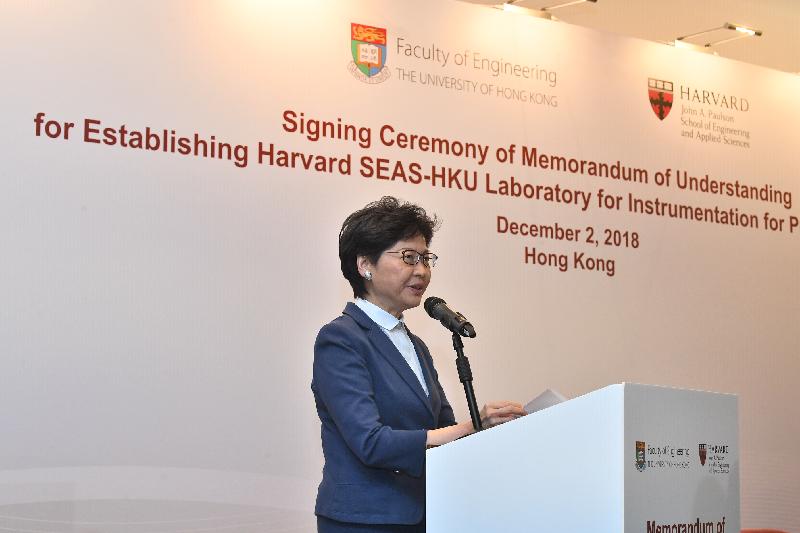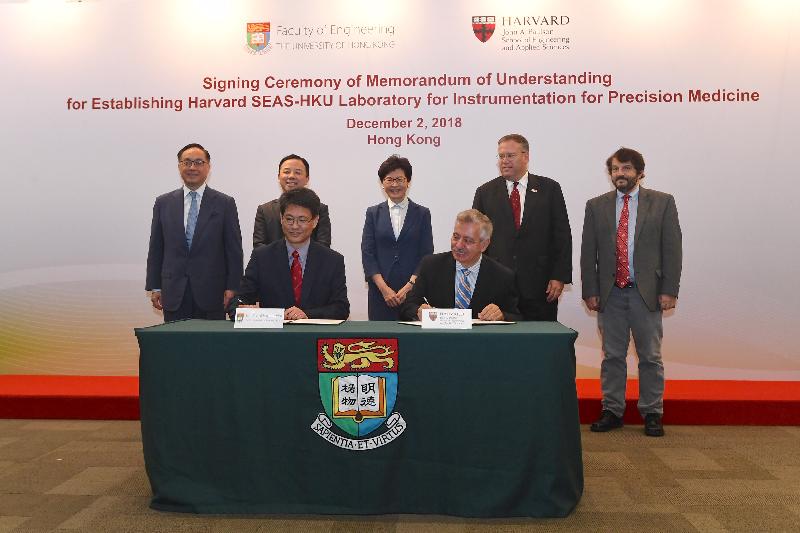Speech by CE at signing ceremony of MoU on establishing Laboratory of Instrumentation for Precision Medicine between HKU Engineering and Harvard SEAS (Eng only) (with photos/video)
******************************************************************************************
Professor Zhang (President and Vice-Chancellor of HKU, Professor Zhang Xiang), Consul General Tong (Consul General of the United States to Hong Kong and Macau, Mr Kurt Tong), Dr Habbal (Executive Dean for Education and Research, Harvard SEAS, Dr Fawwaz Habbal), Professor Chao (Dean of Engineering of HKU, Professor Christopher Chao), distinguished guests, ladies and gentlemen,
Good afternoon. I am most delighted to join the ceremony today and see the forging of close partnership between two world-leading universities in conducting frontier research in Hong Kong.
Since taking up the office of Chief Executive of the Hong Kong Special Administrative Region in July last year, I have been putting personal attention and serious emphasis on developing innovation and technology (I&T) in Hong Kong. I have strong faith in the scientific research capabilities of our local universities, as well as our ability to attract world-acclaimed universities and research institutes to collaborate with us and carry out forward-looking research projects that will benefit the humankind. Our time-tested legal system, robust protection for intellectual property and strong financial sector also lend an edge to Hong Kong in translating research and development (R&D) outcomes to business and employment opportunities.
To complement our existing strengths, resource support from the Government is crucial. Therefore, in the past year or so, I have allocated a total of HK$78 billion (US$10 billion) for I&T purposes. We have introduced a tax incentive to encourage private corporations to invest in R&D and a matching grant to induce private donors to support university research. Amongst the many initiatives introduced, I would say that there is one which could not be delivered simply by money, though we do set aside HK$10 billion (or US$1.3 billion) for that purpose. This is our ambition to establish in Hong Kong two research clusters – one is Health@InnoHK on healthcare technologies, and the other is AIR@InnoHK on artificial intelligence and robotics technologies-through collaboration between our local universities and renowned universities and research institutionsoutside Hong Kong.
I am glad to say that through our intensive reaching out as well as good cooperation already established by our universities with overseas universities, the global research community has warmed to our cluster initiative. Within a short period of time, quite a number of institutions and universities from outside Hong Kong are teaming up with local partners to join these clusters. We are working in full steam to have the first batch of laboratories established in the clusters starting from the latter half of 2019. In this regard, I am extremely delighted and encouraged to learn that the HKU Faculty of Engineering and Harvard University School of Engineering and Applied Sciences are interested in conducting collaborative research on developing instrumentation for precision medicine in Health@InnoHK. I look forward to a great proposal coming out from such mutual interest and enthusiasm. My colleagues in the Innovation and Technology Bureau stand ready to facilitate.
There is no doubt that a fervid I&T atmosphere has built up in Hong Kong. I do hope that the whole I&T value chain, all the way from benchside discovery to translational research, technology transfer and commercialisation, will create enormous opportunities and quality jobs for our young people. To attract more local young people to pursue R&D, all local students enrolled in research post-graduate programmes funded by the University Grants Council are now enjoying tuition fee waiver starting from the 2018/19 academic year. We have also launched two schemes for admitting and nurturing I&T talent earlier this year. The Technology Talent Admission Scheme provides a fast-track arrangement for admitting talent from outside Hong Kong, and the Technology Talent Scheme provides funding to recruit postdoctoral talent and train our workforce in advanced technologies.
The HKSAR Government is committed to attracting world-leading research institutions to conduct collaborative research. This afternoon, the signing of the MoU between the HKU Faculty of Engineering and Harvard John A. Paulson School of Engineering and Applied Sciences, which signifies enhanced collaboration and cross-fertilisation in the research area of precision medicine in Hong Kong, is a very significant step in this endeavour. I wish the two universities great success in the collaboration. Thank you very much.
Ends/Sunday, December 2, 2018
Issued at HKT 16:30
Issued at HKT 16:30
NNNN
Photo
Audio / Video
CE witnesses signing of MoU on establishing Laboratory of Instrumentation for Precision Medicine between HKU Engineering and Harvard SEAS




